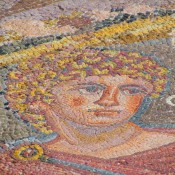Archaeologists exploring the Agora (market) of ancient Paphos have found a small tablet with the name of an official in Greek and a plethora of other artefacts including a golden pendant, it was announced this week.
“The most spectacular finds are a golden earring or pendant, ending in an ivy leaf, bronze objects such as a jug, a ladle with an iron handle, bronze ring, numerous coins, pins and other artefacts,” the department of antiquities said. “The most notable artefact among the lead objects – apart from a ladle with an iron handle, similar to the one uncovered last year, and weights – is a small tablet with Greek inscription mentioning the official –- Seleukos, son of Agoranomos (market administrator) Ioulios Bathylos.
Paphos was the capital of Cyprus in the Hellenistic and Roman periods.
The research took place between August 17 and the end of September.
The archaeologists from the Institute of Archaeology of the Jagiellonian University in Kraków, Poland, also unearthed numerous other objects including fine wares, plain wares, cooking pottery, transport amphorae, storage vessels, dated to the Hellenistic, early and late Roman, as well as Byzantine periods.
One section of the Agora, contained material – mostly pottery – of a purely Hellenistic origin, as well as walls, floors and habitation levels, which means that this area had certainly been in use during the Hellenistic period,” the department said.
Architectural remains dating back to the Roman period were also uncovered in the same area.
In 2011, five rooms were uncovered and partly explored and during the current excavations more rooms were found, bringing the number up to 12. “Most of them possibly functioned as shops (tabernae) in the early Roman period,” the department said, adding that they were probably destroyed in an earthquake.
Beneath a collapsed wall in one room, archaeologists found a bronze jug and broken vessels on the floor, including a finely preserved mortarium – a large bowl with two producer stamps and writing with the owner’s name.






